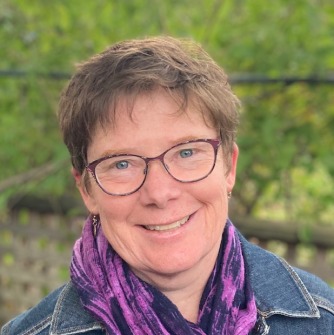| Contact |
Center for Research and Creative Activities
|
|---|
In Salem State’s English department, Professor Jan Lindholm is interested in the implications of the words we use. In all her courses, Lindholm, much of whose research focuses on feminist rhetoric and theology, is helping students to understand more deeply that language matters, that the words they use and encounter throughout their lives have tremendous power and deserve their serious attention. This focus is especially evident in Lindholm’s work as a hymn writer, in which she often chooses to use the noun Love to represent God.
Lindholm, who attributes her passion for hymn writing, in part, to her early life in a musical family, has been writing hymns since the mid-1990s. This summer during Pride month, she was featured in the CNN article "An affirming hymnal is helping LGBTQ Christians keep the faith", which highlights Lindholm as a contributor to the Hymn Society’s collection Songs for the Holy Other: Hymns Affirming the LGBTQIA2S+ Community. Lindholm’s works “Love Astounding” and “Love’s Rage and Grief” are among 45 queer-affirming hymns in that collection.
Most recently, Lindholm has been working on her own collection of hymns, set to be published by late spring or summer. In April 2020, Lindholm was contacted by Augsburg Fortress (a publisher that specializes in theology, liturgy, and church music) with the opportunity to create a single-author collection of her hymns—a first for Lindholm, whose hymns and choral anthem texts have been individually published and performed, but not yet collected. The forthcoming book of hymns, titled Love Astounding: Hymns of Jeannette M. Lindholm, was contracted later that year, and Lindholm began work on the manuscript.
In spring 2022, the Center for Research and Creative Activities awarded Professor Lindholm a Research APR Grant, which allowed Lindholm a reduced teaching load to continue working on her manuscript. During this time, Lindholm wrote two additional hymns to be added to Love Astounding, along with an introduction that details how Lindholm’s background as a professor of rhetoric and feminist rhetorical theory influences and informs her practice as a hymn writer.
The spring proved to be a busy time for Lindholm, who was also invited by the Institute of Liturgical Studies to present at the Institute’s annual conference. In April, Lindholm led a three-hour seminar titled “Poetry’s Contributions to Congregational Lament and Praise,” in which she applied genre theory to discuss meaning-making and uses of silence in liturgical contexts. Lindholm was also commissioned by the Institute, along with composer Robert Buckley Farlee, to collaborate on a hymn, “Love Leads Us through the Wind and Waves,” which they presented and discussed at a workshop.
Love, for Professor Lindholm, is a non-patriarchal name for the Divine. The hymns collected in Love Astounding, she says, expand the imagery and language used for the Divine and demonstrate that Love is always present with human beings, including in times of suffering and grief.
Love, for Professor Lindholm, is a non-patriarchal name for the Divine. The hymns collected in Love Astounding, she says, expand the imagery and language used for the Divine and demonstrate that Love is always present with human beings, including in times of suffering and grief. These sentiments are supported by Lindholm’s research of trauma theory, which identifies the impact of trauma and focuses on the healing process. In her hymn collection, Lindholm poses questions to her audience, inviting them to create their own connections, and offers the possibility of hope.
Lindholm notes that many of the themes in Love Astounding are deeply connected to her personal experiences and showcase the loving presence of the Divine. The hymns’ themes are also informed, in part, by the notion of “critique by creating”—a concept Lindholm credits to her father. When Lindholm finds an area where she perceives a gap, she considers how to fill a need. Her writing process often consists of looking at other scholars’ work in theology and biblical criticism. In writing hymns informed by this research, Lindholm hopes to create opportunities for new perspectives and dialogue.
Not surprisingly, Lindholm is mindful of the language and rhetorical devices she uses in her hymns. She considers the ways in which such things as questions, parataxis, imagery, allusion, silence, sound, and a spare use of language all create multiple, dynamic possibilities for meaning-making and engagement when people experience her hymns. Her consideration of sound and allusion extends to the music that she decides to pair with her texts. In multiple ways, music can “interpret” a text, and Lindholm sometimes selects particular tunes, not only for the emotional responses they can evoke, but also for their connection to other hymns that she wants to allude to. As Lindholm continues to collaborate with Augsburg Fortress on the release of Love Astounding, she is working with the publisher’s editors to ensure that these sound-sense connections are clear.
In the English department, Professor Lindholm teaches a variety of courses that connect to her experiences with hymn writing. In her Literature of the Bible courses, which are taught at the undergraduate and graduate levels, Lindholm uses visual art and occasionally her own hymns to supplement course readings as she encourages students to consider different biblical interpretations. Lindholm’s attentiveness to language is also expressed throughout her Grammar and Style and Foundations of Writing courses, where she helps students better understand how they can create meaning and connect with their writing, just as she does in her hymns.
Congratulations on your first book, Professor Lindholm! We look forward to celebrating your publication next year.
----
Do you want to share your research and creative activities with the SSU community? Contact the CRCA at ssu-crca@salemstate.edu and tell us what you’ve been up to!

